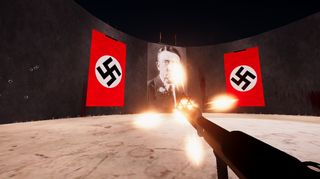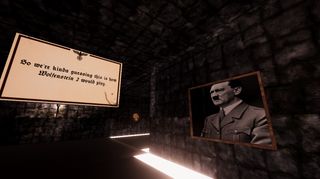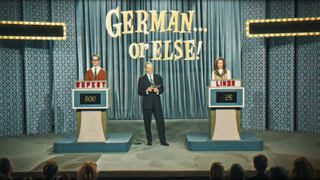Wolfenstein 2 isn't available in Israel, so gamers protested with a parody about Hitler's mustache
The New Colossus was censored in Germany, but not sold at all in Israel. The creators of Wolfenstäche want to know why.

Without context, Wolfenstäche: The New Censorship might make you extremely uncomfortable. You, a faceless G.I., glide down burgundy, Quake Engine corridors until you come face to face with a Reich-era portrait of Adolf Hitler. The supremely on-the-nose "Ride of the Valkyries" starts kicking up dirt, and his infamous toothbrush moustache detaches from his face and propels towards you with evil intent. Your soldier picks up an MP5, with a Star of David mounted on the iron sights, and shoots it down. Suddenly, the chamber is full of Hitler moustaches, angrily fluttering around your field of view like a disoriented swarm of bees. World War II ended a long time ago, but the international wounds in its wake are relevant enough that generally, the world's satirists reserve a certain threshold of tact when targeting Nazi racial policy. Weaponized Fuhrer whiskers seem a little beyond the pale.
Fortunately, there is context.
If you fear that you may be going too far in the face of the population you're supposedly advocating for, is it still satire?
Wolfenstäche, which you can play for free right now on itch.io, was programmed by Shalev Moran, Alon Karmi, and Nadav Hekselman, three indie developers based in Tel Aviv. Mechanically, the game works as a stripped-down Serious Sam lead-pumper—gleefully inane like other browser-based Unity classics such as The Room of 1,000 Snakes. But politically, it aims to lampoon Bethesda, who refused to sell Machine Game's excellent Wolfenstein 2: The New Colossus in Israel—an action that this trio of developers call both "lazy" and "cowardly." Bethesda did not respond to a request for comment for this story.
To be clear, Nazi iconography and artistic immunity has always made for an uncomfortable marriage. German bowdlerization laws famously threaten any use of the Swastika—even for mordant purposes—with criminal punishment. However, Bethesda still released The New Colossus in the country after applying an airbrush to the red armbands and Reichskriegsflagge, and waxing the mustache off of their deranged Venusian Hitler.

Israel, on the other hand, did not get the same treatment. In late October, shortly after the game's release, Israeli gamers ventured to Steam to find that the The New Colossus' prodigal re-conquest of North America was missing from the marketplace. Confused, they petitioned Zenimax for an answer, who responded with a curt announcement clarifying that Wolfenstein 2 wouldn't be available in the region. Zenimax apologized for the inconvenience, but offered no specific reason why.
This is an especially strange call for Bethesda. Israel doesn't have the same municipal censorship laws you find in Germany, and Karmi tells me it's completely legal to display swastikas and make references to the Third Reich in the media, "so long as you're not genuinely supporting Nazi ideology." (He points to a primetime Israeli TV series called The Jews Are Coming, which routinely sends-up Nazism with no edits or concessions.)
"When Inglourious Basterds was first screened, the audience cheered whenever Nazis were killed. We’ve come to an era where teenagers, whose grandfathers breathlessly escaped from Auschwitz, have poetic, digital, cathartic revenge on the ones who annihilated their people," he says. "And to most people here, it’s a wonderful catharsis. Film distributors see no issue with uncensored Nazis here. Neither does the court. Neither does the public. Only game publishers, it seems, are afraid of a 'PR disaster.'"
The biggest gaming news, reviews and hardware deals
Keep up to date with the most important stories and the best deals, as picked by the PC Gamer team.
Heckselman agrees, noting that the depiction of Nazism in Israel is a fading, decrepit taboo, which was only especially prominent during the post-war founding of the state. Furthermore, Nadav tells me that if you follow local politics closely, you'll find the occasional parliament member trying to drum up support for an administrative prohibition of anti-Semitic iconography, but a tangible law never make it across the finish line. "[It's] only done for show," he says.
We’ve come to an era where teenagers, whose grandfathers breathlessly escaped from Auschwitz, have poetic, digital, cathartic revenge on the ones who annihilated their people.
Alon Karmi
Wolfenstein itself doesn't hold any specific anathema either. Before Bethesda took over the rights from id Software, every game in the series was published in Israel, including that (entirely forgotten) 2009 reboot. Karmi highlights this post by Israeli blogger Ido Keinan, where he remembers playing Wolfenstein 3D with his grandfather who served in the Red Army, both of them reveling in the death of Hitler 2000. So the decision to suspend Wolfenstein 2's proliferation in a Jewish state appears to be handed down by a corporate boardroom rather than a closed government channel. "[Bethesda] has decided to pull the game of their own volition," says Karmi. "Should they release the game here, as far as I know, they could just do it, and very few would bat an eye."
In that sense, gunning down the bristles on Hitler's upper lip might be the perfect parody for Bethesda's tentativeness. There are plenty of somber, respectfully pointed moments in The New Colossus, but this is still a pulpy action game where you venture to Nazi space bases and confront a bedwetting Fuhrer. It’s a mashup of silly American pastiche and tyrannous Reich-era politics meant to to portray the Nazis as the soulless flunkees they always were. Censoring it in Israel makes The New Colossus' message ring hollow. If you fear the ramifications of your satire—if you fear that you may be going too far in the face of the population you're supposedly advocating for—is it still satire?
"They could have written a forum thread asking Israelis what the public thinks about Nazis and whether it’s safe. It would have taken them, at most, 30 minutes," says Karmi. "But the industry has gotten complacent and sheltered; so much so that us Israelis have to develop our own Wolfenstein game and say: “Here’s all the things you plugged out of your game. We’re cool with it. The Germans are cool with it. Why aren’t you?"

In a couple years, when Bethesda concludes this Wolfenstein trilogy, perhaps the company will reconsider their censorship policy and let the global Jewish population participate in the ultimate toppling of The New Order. Until then, Israelis will happily demonstrate just how happy they are to laugh at Nazis, and force the rest of us to reckon with our hypocrisy.
"We made Wolfenstäche to remind Bethesda that what they’re doing is wrong and hurtful and ignorant, and to encourage gamers and journalists to keep pestering them because we really do want this to change," says Moran. "I really do want to buy Wolfenstein on PSN and play it. I really do want publishers to stand behind the politics of their games, not half-heartedly, and not just in American culture."

Luke Winkie is a freelance journalist and contributor to many publications, including PC Gamer, The New York Times, Gawker, Slate, and Mel Magazine. In between bouts of writing about Hearthstone, World of Warcraft and Twitch culture here on PC Gamer, Luke also publishes the newsletter On Posting. As a self-described "chronic poster," Luke has "spent hours deep-scrolling through surreptitious Likes tabs to uncover the root of intra-publication beef and broken down quote-tweet animosity like it’s Super Bowl tape." When he graduated from journalism school, he had no idea how bad it was going to get.
Most Popular

